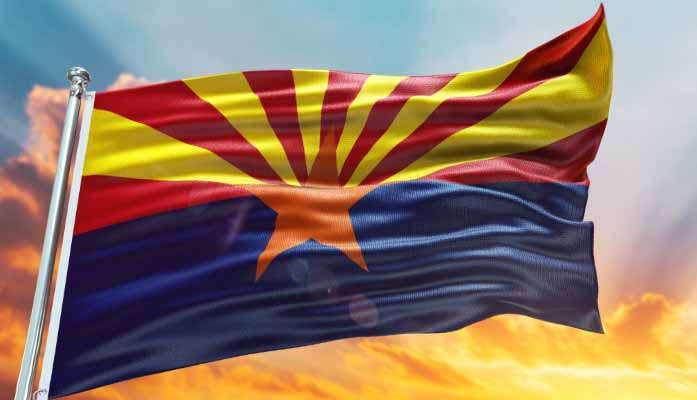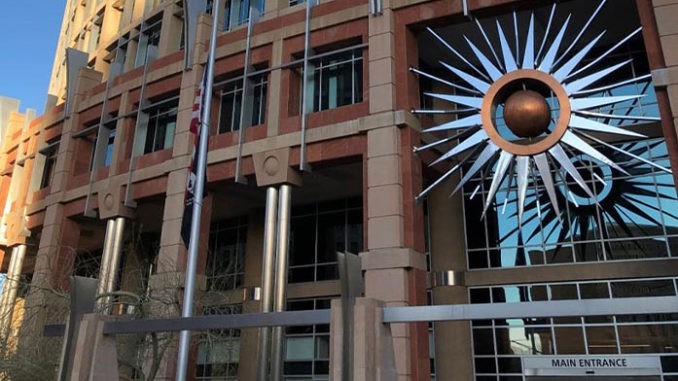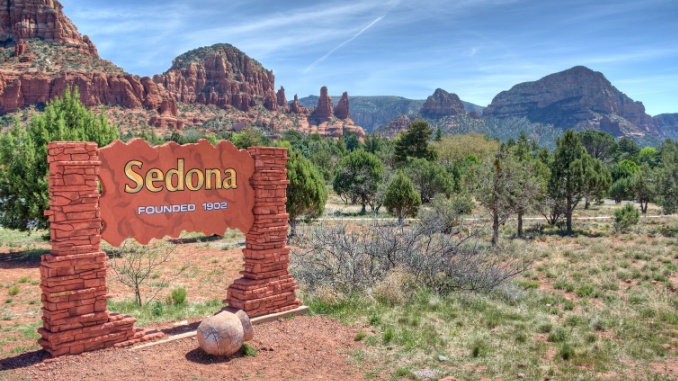
by Jonathan Eberle | Sep 23, 2025 | News
By Jonathan Eberle |
Arizona Senate President Warren Petersen and House Speaker Steve Montenegro announced that Arizona’s legislative leaders have filed amicus briefs in two companion cases before the U.S. Supreme Court: Little v. Hecox (Idaho) and West Virginia v. B.P.J. The cases, expected to be argued this fall, address whether states may preserve the integrity and safety of girls’ and women’s sports by limiting participation to biological females.
Petersen emphasized that the cases offer the Court an opportunity to uphold fairness and safety in female athletics. “These cases give the Court an opportunity to affirm what science and common sense already make clear: biological males hold inherent physical advantages that make women’s athletic competitions unfair and unsafe when they are allowed to participate,” he said.
Speaker Montenegro echoed these sentiments, highlighting Arizona’s legislative action. “Arizona passed the Save Women’s Sports Act to keep competition fair for girls,” he said. “It’s unacceptable that our state’s top lawyer refuses to defend that law. While Attorney General Mayes stands aside, House Republicans are doing the job she won’t—standing up for Arizona’s daughters and every female athlete who trains and competes. The Ninth Circuit sidelined our law; I’m confident the Supreme Court will correct course and affirm what parents and coaches know: girls’ sports are for girls.”
The Save Women’s Sports Act, signed into law in 2022, restricts participation in girls’ athletic events at public schools to biological females. After Attorney General Mayes declined to defend the statute, Republican leaders in the House and Senate intervened in federal court. While the Ninth Circuit recognized the state’s interests in competitive fairness, student safety, and equal athletic opportunities, it left the act enjoined as applied to two transgender, biologically male athletes.
Arizona’s briefs in the Idaho and West Virginia cases urge the Supreme Court to uphold state laws that maintain female-only sports to protect safety, fairness, and equal athletic opportunities. The filings assert that the federal injunction against Arizona’s law has already harmed girls, impacting placements, roster spots, and playing time. They also argue that courts should defer to elected legislatures—rather than unelected athletic bodies—when setting uniform participation standards, particularly in areas involving scientific and medical disputes.
“Girls deserve a level playing field,” Speaker Montenegro said. “House Republicans will continue to vigorously defend Arizona’s law and support states working to keep girls’ sports fair and safe.” The Supreme Court’s rulings in the Idaho and West Virginia cases will likely shape the future of Arizona’s law and similar legislation across the country.
Jonathan Eberle is a reporter for AZ Free News. You can send him news tips using this link.

by Jonathan Eberle | Sep 22, 2025 | Economy, News
By Jonathan Eberle |
Arizona workers in Yuma and Lake Havasu City-Kingman have seen some of the strongest wage growth in the nation over the past five years, according to a new analysis of Bureau of Labor Statistics data.
The study, conducted by AlgoCademy, reviewed mean hourly wage changes across 395 U.S. metropolitan statistical areas between 2019 and 2024. It found that two Arizona metros ranked in the national top 50 for wage growth.
Yuma placed 11th nationwide, with mean hourly wages climbing from $19.54 in 2019 to $25.74 in 2024—a 31.73% increase. Lake Havasu City-Kingman followed at 26th, where average wages rose from $19.90 to $25.89, a 30.10% increase.
Nationwide, the strongest growth occurred in San Jose-Sunnyvale-Santa Clara, California, where wages jumped 44.29% to an average of $58.25 per hour, reflecting the tech hub’s continued economic strength. Other metros in the top five included Sebring, Florida (up 38.74%), Decatur, Illinois (37.89%), Boulder, Colorado (37.84%), and Bellingham, Washington (37.10%).
AlgoCademy’s founder and CEO, Mircea Dima, noted that the findings highlight a broad trend: wage growth is not confined to large urban centers. “Smaller and mid-sized areas like Grants Pass, Oregon, Modesto, California, and Logan, Utah are all seeing wage increases above 34%, showing that opportunities for higher earnings are spreading beyond major U.S. cities,” Dima said. “These trends are a clear sign that workers across the country are benefitting, which can have a positive effect on local communities, from boosting spending power to attracting new talent and investment.”
The research underscores that wage gains have been widespread. While high-growth areas like Silicon Valley continue to dominate in raw numbers, smaller regions—including several in Arizona—are seeing wages rise at a pace that outstrips many larger metropolitan areas. Arizona’s results put the state in strong company, showing that even outside its largest metros, wages have grown substantially since 2019.
Jonathan Eberle is a reporter for AZ Free News. You can send him news tips using this link.

by Jonathan Eberle | Sep 17, 2025 | Economy, News
By Jonathan Eberle |
Arizona residents could collectively lose millions of dollars to fake gambling websites this fall, according to a new study analyzing Federal Trade Commission (FTC) scam reports. The report, conducted by online gaming marketplace Chicks Gold, found that Arizona consumers reported $7.9 million in losses between April and June of this year from scams linked to fake gambling and gaming sites. Analysts warn those numbers could rise sharply as the NFL season, the most bet-on sport in the United States, fuels a wave of online wagering.
“Scammers know there’s likely to be a surge in inexperienced bettors searching online for wagering platforms,” said Al Alof, CEO of Chicks Gold and spokesperson for the study. “That makes them especially vulnerable to fake sportsbooks or offers that appear too good to be true.”
The study examined scams across five FTC subcategories connected to fraudulent gambling platforms: malware and exploits, online shopping, tech support, social networking, and prizes, sweepstakes, and lotteries. Nationally, 106,531 reports were filed in Q2, totaling nearly $192 million in losses, or an average of $1,965 per report. Arizona’s losses were significantly higher: 2,830 reports led to nearly $7.95 million stolen, averaging $2,811 per report—43% higher than the national average.
The most damaging category for Arizona residents was prizes, sweepstakes, and lotteries, which accounted for $4.1 million lost across just 408 reports, averaging more than $10,000 per incident. That placed Arizona sixth in the nation for per-report losses linked to these types of scams, behind Montana, Maine, South Dakota, Wyoming, and North Dakota.
According to the study, fraudulent gambling and gaming operations exploit consumers in several ways:
- Malware and exploits: Fake casino sites that prompt users to download spyware disguised as “mods” or “cheat tools.”
- Online shopping scams: Fake sites selling in-game items, currency, or memberships that never arrive.
- Tech support fraud: Pop-ups or sham help desks convincing players to share sensitive information.
- Social networking scams: Fake or hijacked profiles distributing phishing links in gaming communities.
- Prizes, sweepstakes, and lotteries: Lures promising jackpots or loot boxes that require upfront payment or personal data.
“These scams thrive on community and urgency,” Alof said. “Gamers searching for new releases or fans eager to place bets can be tricked into handing over money or sensitive information.” The rise in gambling scams has also been noted by the Better Business Bureau (BBB), which reports that complaints about online gambling platforms more than doubled since 2023. Users described problems ranging from malfunctioning slot games and altered wagers to deceptive ads and phishing attempts.
To protect themselves, Alof urged consumers to:
- Verify licensing and URLs: Legitimate sportsbooks are licensed by state regulators. Misspelled domains or unofficial app stores are red flags.
- Avoid unrealistic offers: “Guaranteed wins” or oversized bonuses are often bait for scams.
- Use secure payments: Credit cards or PayPal provide better protection than wire transfers or gift cards. Enabling two-factor authentication also reduces risk.
Analysts caution that both sports bettors and traditional gamers face exposure. Beyond the NFL betting surge, Alof noted that the release of popular video games creates another avenue for fraud. When legitimate gaming sites crash under demand, players may turn to unverified download links, which scammers exploit. With Arizona already posting losses above the national average, experts warn vigilance will be crucial in the months ahead.
Jonathan Eberle is a reporter for AZ Free News. You can send him news tips using this link.

by Jonathan Eberle | Sep 16, 2025 | Economy, News
By Jonathan Eberle |
According to a new report from the Common Sense Institute (CSI), inflation in the Phoenix metro area rose 1.4% year-over-year in August, as measured by the Consumer Price Index (CPI). The increase marks a climb from June’s 0.8% reading and ends a four-month stretch where local inflation hovered below 1%.
As noted by the report, the uptick comes as Arizona’s economy shows signs of slowing, with weaker job growth and a cooling housing market. Still, compared with much of the nation, inflation in Phoenix remains subdued. Among the 23 metro areas tracked monthly, Phoenix ranked 20th in year-over-year price growth, continuing a dramatic reversal from 2022 and 2023, when the region routinely topped the list for fastest-rising prices.
Nationally, inflation picked up in August, rising 2.9% from a year earlier after holding steady at 2.7% in the prior two months. Prices across the country have now exceeded the Federal Reserve’s 2% target for more than two years.
Since August 2019, consumer prices in Phoenix have climbed 30.2%, adding about $1,525 in monthly costs for the average Arizona household. Nationally, prices are up 26.3% over the same period. Typically, inflation would run closer to 10% in a five-year span. On a two-month basis, Phoenix saw a 0.9% increase from June to August, tying January for the largest short-term jump of the year. Nationally, prices rose 0.6% over that period.
Housing costs remain a key driver of Phoenix’s relatively low inflation reading. Shelter prices fell 0.1% year-over-year in August, the fourth consecutive month of negative growth. Excluding shelter, inflation in the Valley was 2.3%—still below the national average, but nearly double the headline local figure. The Federal Reserve, which aims to balance price stability with job growth, faces a complicated outlook. While local inflation has hovered below target for nearly a year, national prices have not fallen under 2.3% since 2021.
Jonathan Eberle is a reporter for AZ Free News. You can send him news tips using this link.

by Jonathan Eberle | Sep 14, 2025 | News
By Jonathan Eberle |
What began in August as a temporary pause on Sedona’s automated license plate reader (ALPR) program has now become a full termination. At its September 9 regular meeting, the Sedona City Council voted unanimously to sever its contract with Flock Safety and remove all ALPR cameras from city limits. The vote came under agenda item AB 3261, which had originally been slated for discussion of a possible citizen working group to review policies surrounding the technology. Instead, council members chose to end the program outright, citing concerns over transparency, trust, and civil liberties.
The decision builds on the council’s August 24 action, when members voted 5–1 to deactivate 11 cameras already installed and block the installation of a twelfth. At that time, the program was effectively frozen while staff compiled a timeline of its approval and explored potential safeguards through a future citizen advisory group.
By early September, however, new information came to light about Flock’s federal partnerships. The company acknowledged limited pilot programs with U.S. Customs and Border Protection and Homeland Security Investigations, contradicting earlier statements to city officials that no data-sharing was occurring. That disclosure, coupled with weeks of strong public opposition, prompted the council to move from pause to permanent shutdown.
Council members expressed frustration that the technology had been introduced without a broader policy conversation about its implications. “This began as a handful of people who viewed these license plate readers as a modern policing tool,” one member said. “But what was missed was the question of whether we should be collecting and storing data on innocent people.”
While several members noted that ALPRs have proven useful in other communities, the combination of mistrust in the vendor and unease about federal access to local data swayed the body toward termination. “The only way to ensure data is not shared or abused is to not have it,” another council member remarked.
The unanimous vote represents a shift from the August meeting, when Mayor Scott Jablow supported continuing the program and Vice Mayor Holli Ploog was absent. This time, all members aligned in favor of ending the city’s relationship with Flock and removing the cameras.
The debate has mirrored national disputes over surveillance technology. As reported in the August 24 article, communities from Arkansas to New York have raised similar objections, with residents warning of potential erosion of civil liberties. In Sedona, residents filled inboxes with emails and spoke at public forums, urging leaders to prioritize privacy over surveillance.
The council’s decision closes the door—at least for now—on the use of ALPRs in Sedona. Members left open the possibility that the issue could be revisited in future years if public attitudes or technology practices change but stressed that significant shifts would be necessary before reconsideration.
Jonathan Eberle is a reporter for AZ Free News. You can send him news tips using this link.





